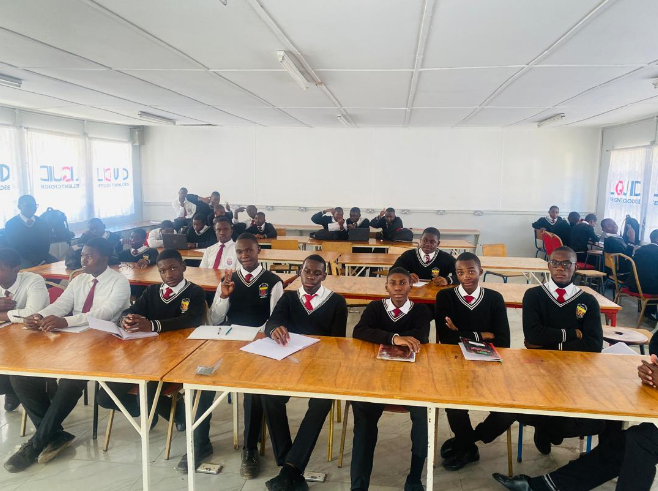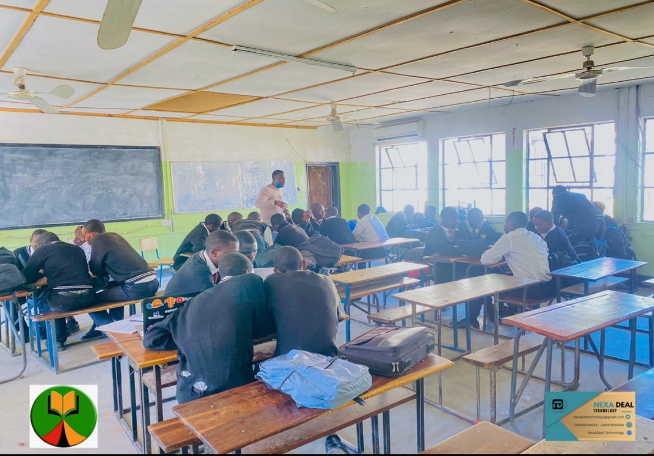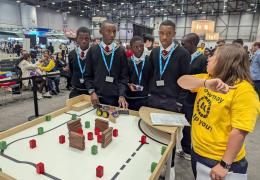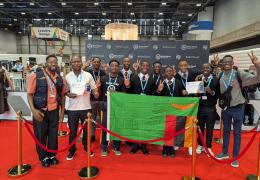Technically skilled workers are desperately needed in a country like Zambia. However, colleges and universities are not producing enough graduates with the requisite skills. Why? One explanation for this is that many children are hardly exposed to technology throughout their early years, whether it be through toys or equipment. This is true not only for rural regions but also for a sizable section of the urban population.
Realizing this, SOZ has launched a project called "Playing with Technology". The idea is to provide secondary school pupils who are interested in technology with the chance to create a wide range of applications using basic tools, like a small computer, a small robotic arm, different sensors, and so on. And to give you a clearer picture: the set of components pupils receive for this and which is provided by SOZ, costs between 40 and 50 euros. Pupils participate voluntary and in their free time—simply because they enjoy it and perhaps because they see a future for themselves in this field.
To provide the necessary guidance at schools, SOZ collaborates with Given Sichilima, a local consultant who specializes in technical computer applications, including artificial intelligence (AI), both in business settings and in its integration into education.
A copy of Given's report from the previous quarter is included below. To be clear, Given works for SOZ one day a week on average. The school mentioned is government-funded—many Zambians who can afford it attend private schools. Most pupils come from families with limited access to technology.
Update on Training Activities by Given Sichilima
Students from Munali Secondary School participating in an ICT and AI training session. Special thanks to Munali Secondary School for their continued support and collaboration in making these sessions possible.
As part of my work with SOZ Foundation, I have been conducting regular ICT and AI-focused training sessions at Munali Secondary School in Lusaka, Zambia. These sessions are designed to introduce students to the foundations of computing, programming, and the application of Artificial Intelligence in technical environments.
- Number of Schools: 1 (Munali Secondary School)
- School Level: Mixed-level classes (Grades 8, 9, and 12)
- Number of Classes: 2
- Class 1: 19–20 students (meets every Thursday from 12:30 hrs to 14:30 hrs)
- Class 2: 20 students (meets every Friday from 09:00 hrs to 10:30 hrs)
- Total Students Impacted: Approximately 39–40 students weekly
- Frequency: Weekly sessions
Topics and Activities Covered
- Introduction – A New Information Revolution (basic overview)
- Understanding the three major technological developments driving the current information revolution:
▪ Microcomputers embedded in devices generating massive data.
▪ The Internet of Things (IoT): interconnectivity of sensors, actuators, and other devices.
▪ The rise of Artificial Intelligence (AI) to analyze large volumes of data and enable new applications. - Discussion on the role of bulk data in AI and the security challenges in highly integrated systems.
- Understanding the three major technological developments driving the current information revolution:
- Raspberry Pi (RPi) – Single-Board Computers
- Introduction to Raspberry Pi as a hybrid between a controller and a general-purpose computer.
- Hands-on exercises on connecting sensors and actuators using the RPi, Python programming, and the Geany editor.
- Artificial Intelligence Basics
- Introduction about AI and also Real-life applications of AI, IoT, and data-driven decision-making just to make students understand AI and what it is about.
- Introduction about AI and also Real-life applications of AI, IoT, and data-driven decision-making just to make students understand AI and what it is about.
Practical Focus
Because of limited computers and varying student schedules, the students were split into two groups. Each group participates in hands-on exercises using Raspberry Pi computers, learning to write Python programs, interact with hardware, and understand how intelligent sensors and actuators communicate with central systems. These sessions inspire students to see how computers are integrated into real-world systems and introduce them to future-oriented technologies such as IoT and AI. The initiative aims to lay a strong foundation for ICT literacy and spark interest in technical fields among the students.
— Given Sichilima
Msc Computer Science
Bsc ICT
AI Educator (Engineer, Researcher)
SOZ Local Representative
Email: givensichilima1998@gmail.com
PDF: Update on Training Activities by Given Sichilima.pdf
With support from Given, several pupils collaboratively built a model-robot capable of sorting red and black blocks. It was very encouraging for both the course participants and us that, based on their initial design, they were invited to complete their project in Sweden.
The two pictures below were taken during the presentation of their final result.
Lastly, even though the components the students utilize are inexpensive (all equipment is provided by SOZ), they still require a laptop in order to program and run the small computer that is an integral component of the equipment. Therefore, SOZ will be pleased to accept used computers, which we will repair and use in the project.
Technically skilled workers are desperately needed in a country like Zambia. However, colleges and universities are not producing enough graduates with the requisite skills. Why? One explanation for this is that many children are hardly exposed to technology throughout their early years, whether it be through toys or equipment. This is true not only for rural regions but also for a sizable section of the urban population.
Realizing this, SOZ has launched a project called "Playing with Technology". The idea is to provide secondary school pupils who are interested in technology with the chance to create a wide range of applications using basic tools, like a small computer, a small robotic arm, different sensors, and so on. And to give you a clearer picture: the set of components pupils receive for this and which is provided by SOZ, costs between 40 and 50 euros. Pupils participate voluntary and in their free time—simply because they enjoy it and perhaps because they see a future for themselves in this field.
To provide the necessary guidance at schools, SOZ collaborates with Given Sichilima, a local consultant who specializes in technical computer applications, including artificial intelligence (AI), both in business settings and in its integration into education.
A copy of Given's report from the previous quarter is included below. To be clear, Given works for SOZ one day a week on average. The school mentioned is government-funded—many Zambians who can afford it attend private schools. Most pupils come from families with limited access to technology.
Update on Training Activities by Given Sichilima
Students from Munali Secondary School participating in an ICT and AI training session. Special thanks to Munali Secondary School for their continued support and collaboration in making these sessions possible.
As part of my work with SOZ Foundation, I have been conducting regular ICT and AI-focused training sessions at Munali Secondary School in Lusaka, Zambia. These sessions are designed to introduce students to the foundations of computing, programming, and the application of Artificial Intelligence in technical environments.
- Number of Schools: 1 (Munali Secondary School)
- School Level: Mixed-level classes (Grades 8, 9, and 12)
- Number of Classes: 2
- Class 1: 19–20 students (meets every Thursday from 12:30 hrs to 14:30 hrs)
- Class 2: 20 students (meets every Friday from 09:00 hrs to 10:30 hrs)
- Total Students Impacted: Approximately 39–40 students weekly
- Frequency: Weekly sessions
Topics and Activities Covered
- Introduction – A New Information Revolution (basic overview)
- Understanding the three major technological developments driving the current information revolution:
▪ Microcomputers embedded in devices generating massive data.
▪ The Internet of Things (IoT): interconnectivity of sensors, actuators, and other devices.
▪ The rise of Artificial Intelligence (AI) to analyze large volumes of data and enable new applications. - Discussion on the role of bulk data in AI and the security challenges in highly integrated systems.
- Understanding the three major technological developments driving the current information revolution:
- Raspberry Pi (RPi) – Single-Board Computers
- Introduction to Raspberry Pi as a hybrid between a controller and a general-purpose computer.
- Hands-on exercises on connecting sensors and actuators using the RPi, Python programming, and the Geany editor.
- Artificial Intelligence Basics
- Introduction about AI and also Real-life applications of AI, IoT, and data-driven decision-making just to make students understand AI and what it is about.
- Introduction about AI and also Real-life applications of AI, IoT, and data-driven decision-making just to make students understand AI and what it is about.
Practical Focus
Because of limited computers and varying student schedules, the students were split into two groups. Each group participates in hands-on exercises using Raspberry Pi computers, learning to write Python programs, interact with hardware, and understand how intelligent sensors and actuators communicate with central systems. These sessions inspire students to see how computers are integrated into real-world systems and introduce them to future-oriented technologies such as IoT and AI. The initiative aims to lay a strong foundation for ICT literacy and spark interest in technical fields among the students.
— Given Sichilima
Msc Computer Science
Bsc ICT
AI Educator (Engineer, Researcher)
SOZ Local Representative
Email: givensichilima1998@gmail.com
PDF: Update on Training Activities by Given Sichilima.pdf
With support from Given, several pupils collaboratively built a model-robot capable of sorting red and black blocks. It was very encouraging for both the course participants and us that, based on their initial design, they were invited to complete their project in Sweden.
The two pictures below were taken during the presentation of their final result.
Lastly, even though the components the students utilize are inexpensive (all equipment is provided by SOZ), they still require a laptop in order to program and run the small computer that is an integral component of the equipment. Therefore, SOZ will be pleased to accept used computers, which we will repair and use in the project.




